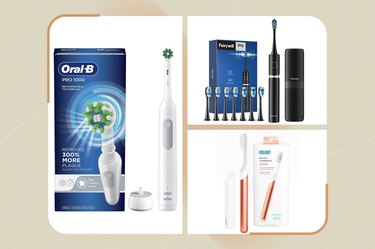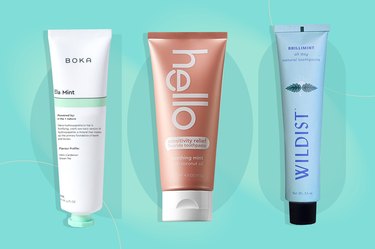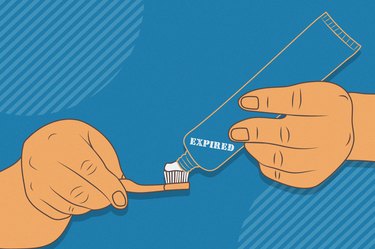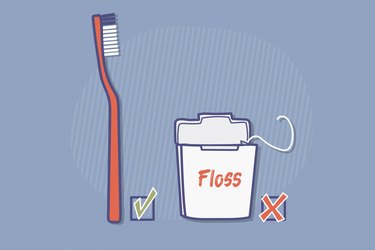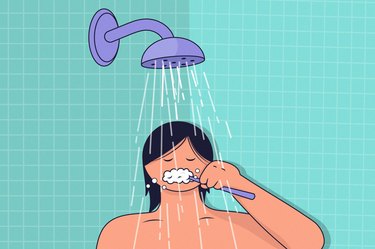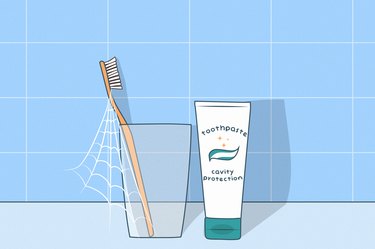
Whether we'd like to admit it or not, we've all made tooth-brushing mistakes like skipping a session or two. Maybe you were rushing out the door in the morning or too tired to properly get ready for bed, so you forgot to brush your teeth. It happens.
But when it comes down to it, how many times a day should you brush your teeth? And what happens if you're only scrubbing them once a day?
Video of the Day
Video of the Day
Here, dentist Jennifer Osei-Fosu, DDS, weighs in.
How Many Times a Day Should You Brush Your Teeth?
According to the American Dental Association (ADA), you should brush your teeth twice a day with a fluoridated toothpaste for two minutes each time. Dr. Osei-Fosu suggests brushing no more than three times a day because too much brushing can wear down tooth enamel.
It's worth noting that the twice-a-day recommendation we're all likely familiar with isn't supported by strong research. In fact, an October 2016 systematic review and meta-analysis in the Journal of Dental Research found no significant link between brushing frequency and incidence of dental decay or cavities.
Still, brushing twice a day is recommended by most dentists and the ADA.
"Brushing your teeth twice a day has more benefits than keeping your breath fresh," says Dr. Osei-Fosu, who's also a Pronamel spokesperson. "When you don't brush your teeth twice a day, you are at high risk for plaque accumulation on your teeth."
Dental plaque is the fuzzy, sticky film you feel along your teeth when you haven't brushed in a while. When plaque isn't removed, it can cause gingivitis and potentially progress into a serious gum infection, Dr. Osei-Fosu says. By regularly removing debris from your teeth, you're also preventing tooth decay, cavities and gum disease.
You've likely been instructed by your dentist to brush your teeth once in the morning and once at night. Dr. Osei-Fosu agrees that the best time to brush your teeth is at the beginning and end of your day.
"Saliva helps to prevent bacteria from attacking your tooth enamel," she says. "However, saliva production significantly decreases at night, which makes brushing before bed critical to your oral hygiene routine. Over time, skipping brushing at night can lead to significant damage."
Is It OK to Brush Your Teeth Once a Day?
The short answer is no, brushing your teeth once a day isn't enough to maintain dental hygiene, per the ADA. As Dr. Osei-Fosu explains, it only takes about four to 12 hours for plaque to begin forming on your teeth. And the longer bacteria is left on teeth, the more trouble it can cause.
Some potential side effects to brushing once a day include:
- Cavities
- Significant decay that can lead to invasive dental treatment or tooth loss
- Reversible or irreversible gum disease and inflammation
- Chronic bad breath
- An increase in oral bacteria, which has been linked to conditions such as heart disease, diabetes and kidney disease (although it's important to note that no research has shown oral bacteria directly causes any of these conditions)
The best way to manage side effects is prevention — aka consistently brushing your teeth twice a day.
What to Do if You Miss a Brushing Session
Life happens and no one is perfect, so missing a brushing session once in a blue moon is OK.
"It's not the end of the world if you occasionally miss a brushing session," Dr. Osei-Fosu says. "However, it's easy to get out of the habit when it comes to maintaining oral hygiene at home."
She suggests if you miss multiple brushing sessions, the first thing you should do is replace your toothbrush and get back in the game. Changing your toothbrush every three months is essential to oral hygiene success.
And consider getting an electric toothbrush — a June 2014 review in the Cochrane Database of Systematic Reviews found electric toothbrushes to be more effective at removing plaque and decreasing gingivitis.
"You should always use a fresh, soft-bristled toothbrush with fluoridated toothpaste," Dr. Osei-Fosu says. "Make sure to floss before bed as well, to remove food and debris from between the teeth and to help keep your breath fresh."
So, How Bad Is It Really to Brush Your Teeth Once a Day?
The ideal tooth-brushing routine is twice a day, once in the morning and once at night. Brushing your teeth once a day can result in plaque buildup and can eventually lead to cavities, gum disease and tooth loss as bacteria attacks your teeth and gums.
If you struggle to remember to brush in the morning or before bed, set friendly reminders or alarms on your phone to stay on top of brushing.
If morning is the challenge, try waking up a bit earlier to give yourself more time for brushing in the a.m. If before-bed brushing often goes by the wayside, try brushing right after dinner, before you settle in to watch TV, work or do evening chores.
"I also encourage you to schedule an appointment with your dentist for a professional cleaning and exam to stay on track," Dr. Osei-Fosu says.
Is this an emergency? If you are experiencing serious medical symptoms, please see the National Library of Medicine’s list of signs you need emergency medical attention or call 911.


